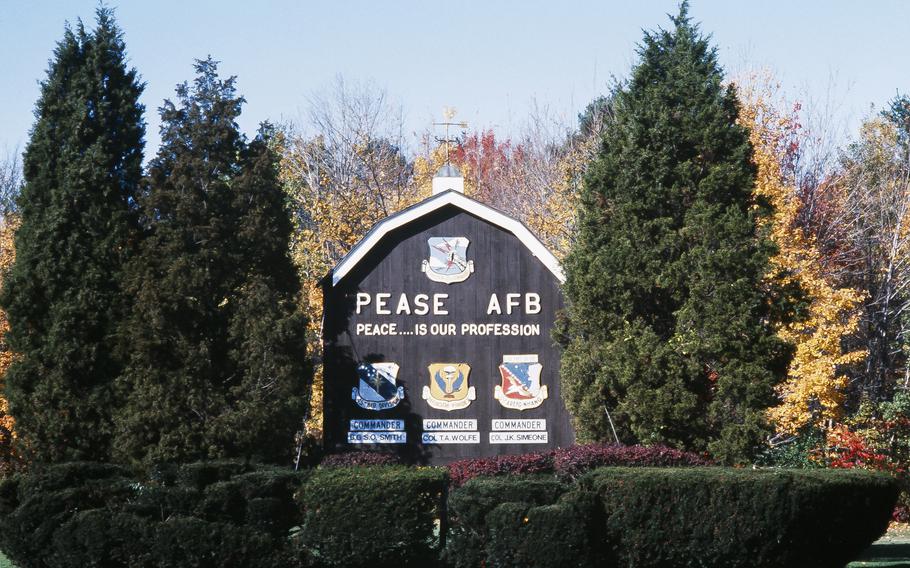
A view of the main gate at Pease Air Force Base New, Hampshire on Oct. 18, 1987. (DAVE CASEY/U.S. Air Force )
PORTSMOUTH, N.H. (Tribune News Service) — The Pease Military Cancer Mortality Study concluded "the number of cancer deaths among U.S. Air Force service members who were stationed at Pease Air Force Base/Air National Guard Base over the past 50 years is nearly identical to the number of cancer deaths expected based on demographically matched U.S. population data."
The study, which was released to the public Thursday, stated "deaths from certain cancers (i.e., lung, prostate and breast) were higher than expected."
The study was conducted by the Epidemiology Consult Service Division of the U.S. Air Force School of Aerospace Medicine (USAFSAM) in response to what a group of widows of Air Force and Guardsmen who served at Pease believe is a high level of cancers and cancer deaths at the base.
The Pease Military Cancer Mortality study was initiated by the 157th Air Refueling Wing in response to those concerns.
The study conclusion noted that although it was "not designed to evaluate specific workplace or environmental exposures, nor to determine a precise cancer risk associated with service at Pease, the findings would be unlikely had community-wide carcinogenic exposure occurred."
Doris Brock is the widow of Kendall Brock, who died in June 2017 from cancer after serving 35 years with the 157th Air Refueling Wing of the National Guard at the former Pease Air Force Base.
Brock and other widows pushed the Air Force to conduct the study after losing their husbands to cancer and seeing a number of other people who served at the base be diagnosed with cancer.
Those cancers and other health concerns were caused by exposure to dangerous PFAS chemicals in drinking water and other known carcinogens they were exposed to, Brock and the other widows believe.
Reached Thursday, Brock said she still "has questions" about the number of cancers and cancer death at Pease.
"I'm still not convinced about their conclusions and the reason why I'm not convinced is I've been in touch with other people from other bases around the U.S. and they're seeing the same types of things," Brock said.
While she questions some of the results of the study, Brock stressed, "I was very happy that this is not the end."
She credited the work done by the 157th Air Refueling Wing to get the study launched and hopes the Air Force will consider doing a "cancer incidence study."
The Pease Military Cancer Mortality Study was "strictly based on death certificates," Brock said.
"A more in-depth study would look at the people who have had cancer but are still alive," Brock said. "There's still a large number of people battling cancer."
The 157th Air Refueling Wing will host U.S. Air Force School of Aerospace Medicine (USAFSAM) representatives, who will present the findings of the study June 23 at 2 p.m.
The event is open to valid military ID card holders, including members of the New Hampshire Air National Guard, military dependents and retirees.
Col. John Pogorek, commander of the 157th Air Refueling Wing, thanked "our many advocates, including our state and federal partners, Department of Defense, Congressional delegation, and USAFSAM for completing this study."
"It is an important step toward addressing the health concerns of the men and women who have worked on Pease Air Force Base and Pease Air National Guard Base," he said. "We look forward to discussing the results with USAFSAM representatives June 23."
The "records-only" study investigated "cancer deaths among U.S. Air Force service members stationed at Pease Air Force Base/Air National Guard Base ... between 1970 and 2018."
More than 34,000 service members served at Pease for at least one day during the time period studied, and the study identified 6,183 deaths among Pease members, of which 1,956 or 31.6% were from cancer.
The Air Force noted in the study's conclusion that "the results of this study do not obviate the need for other investigations, such as the Pease Study currently underway by ATSDR (the Agency For Toxic Substances and Disease Registry."
The ATSDR is conducting the Pease study for people exposed to contaminated drinking water at the former Pease Air Force Base.
Thousands of people working at Pease International Tradeport, along with children and infants who attended two day cares there, were exposed to multiple PFAS chemicals from contaminated water in the city-owned Haven well until its closure in 2014. The water was contaminated by firefighting foam used at the former base.
In addition to being a suspected carcinogen, PFAS exposure can harm childhood development, increase cholesterol levels, hurt the immune system and interfere with human hormones, according to the ATSDR.
The Pease Health Study, which was created through legislation championed by Sen. Jeanne Shaheen, D-New Hampshire, is seeking 1,000 adults who were exposed to the contaminated water and 350 kids ages 4 to 17.
Anyone interested can call the Pease Study call center at 603-846-6192 to be screened for eligibility.
(c)2021 Portsmouth Herald, N.H.
Visit Portsmouth Herald, N.H. at www.seacoastonline.com/portsmouthherald
Distributed by Tribune Content Agency, LLC.